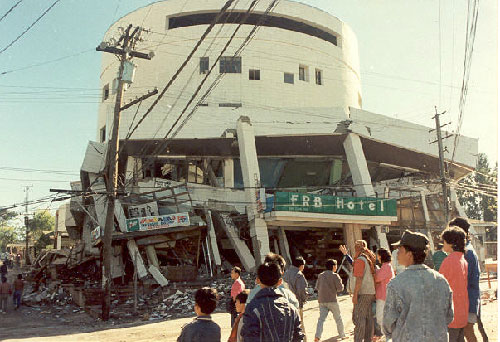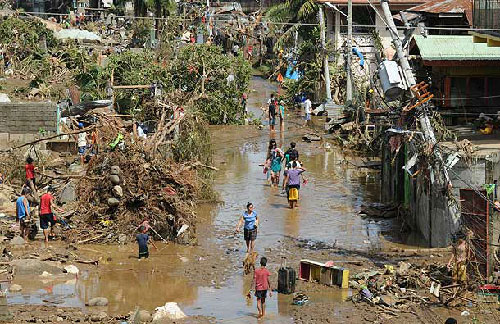10 most catastrophic disasters in the Philippines
Due to the unfavorable geographical position, the Philippines often suffers from natural disasters such as earthquakes, tsunamis, floods or volcanic eruptions, with great human and property losses.
>>>10 biggest storms recorded in history

On February 1, 1212, the Mayon volcano, on the big island of Luzon, erupted into the nearby town of Cagsawa, leaving about 1,200 people dead.In the photo, the town was completely wiped out, leaving only a fraction of the remains of the central church left.The latest eruption of this volcano was on July 14, 2008, leaving thousands of people evacuated.(Photo: netizen)

Taal Volcano, 60km from Manila, suddenly erupted on May 30, 1911, killing 1,300 people living in neighboring villages.The impact range of the eruption is 230 square kilometers.(Photo: natgeocrative)

Typhoon Trix with winds of 140km / h landed on the Bicol area on Luzon island on October 16, 1952, accompanied by floods and landslides, killing nearly 1,000 people.(Photo: Wikimedia)

The 7.9-magnitude earthquake triggered a tsunami hit the Gulf of Moro near the island south of Mindanao on August 16, 1976, killing 5,000-8,000 people.In the picture, Tibpuan village in Lebak city on Mindanao island, was razed.Everything was wiped out on the path of the tsunami.(Photo: Wikipedia)

The typhoon Nitang, whose international name is Ike, attacked the large island of Luzon on August 31, 1984, killing more than 3,400 people and injuring, 480,000 people lost their homes, 21 towns were completely destroyed.19 provinces are directly affected, with a total loss of 111 million USD (equivalent to the exchange rate of 1 billion USD in 2012).(Photo: eurosolodaire)

On July 16, 1990, a magnitude 7.8 earthquake struck a mountain resort in Baguio City and other areas in the northern Philippines, killing more than 1,600 people and 28 large buildings collapsed.Baguio was isolated from the outside for 48 hours.(Photo: cityofpines)

More than 5,000 people were killed and about 3,000 went missing when Tropical Storm Thelma attacked downtown Ormoc on Leyte Island on November 15, 1991.Nearly 5,000 houses were completely destroyed.The total damage caused by Hurricane Thelma is estimated at $ 27.7 million.(Photo: skyscrapercity)

On February 17, 2006, after a 10-day rain, a 450-meter high mountain slope in Guinsaugon village, central Leyte island, subsided and landed on the village.More than 1,100 people died, 500 houses and a school were buried.(Photo: netizen)

Super typhoon Sendong, named International Washi and the most dangerous storm in the world in 2011, landed in the northern part of Mindanao island on December 16, causing flood water to rise 3.3 meters, making more than 2,300 dead and missing, 100,000 people have to leave their homes.Total damage is estimated at over 48 million USD.(Photo: beyondbooksandwalls)

Hurricane Pablo, whose international name is Bopha, swept across the main island south of Mindanao, one of the areas rarely affected by storms, and on December 3, 2012 killed 1,900 people and lost 80,000 people. homeless, 179,000 people mobilized evacuated.Damage is estimated to reach 210 million USD.(Photo: Herald)
- 5 most catastrophic natural disasters in human history
- Philippines: 230 natural disasters over two decades
- The number of deaths from typhoons in the Philippines exceeds 900
- The most powerful storm in 12 years caused catastrophic flooding in the US
- Philippines: 25 people died from storm Nock-ten
- Flash floods in the Philippines: 650 deaths, 800 missing
- Philippines devastated after a big storm
- Vietnam is not affected by the Philippine earthquake
- The Philippines struggled with the consequences of two storms
- Philippines: Nearly 500 people were killed by typhoon Washi
- 25 interesting things you may not know about the Philippines
- 50 people died of typhoons in the Philippines
 Is the magnetic North Pole shift dangerous to humanity?
Is the magnetic North Pole shift dangerous to humanity? Washington legalizes the recycling of human bodies into fertilizer
Washington legalizes the recycling of human bodies into fertilizer Lightning stone - the mysterious guest
Lightning stone - the mysterious guest Stunned by the mysterious sunset, strange appearance
Stunned by the mysterious sunset, strange appearance